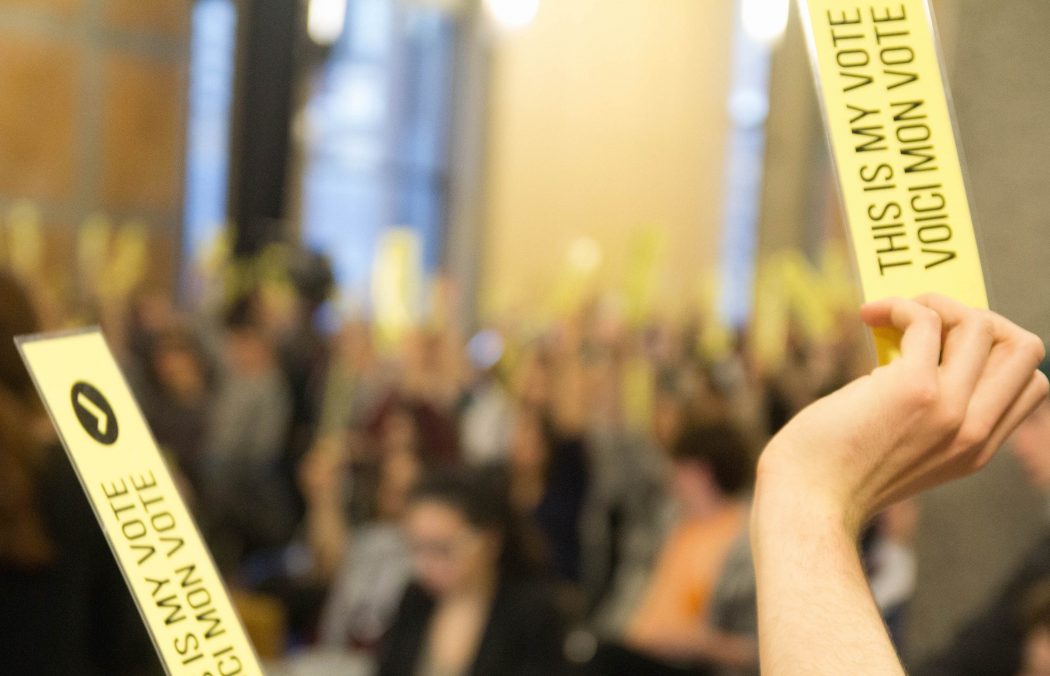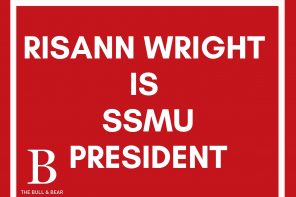On September 17, the Students’ Society of McGill University (SSMU) Board of Directors unanimously ratified a 2016 Judicial Board (J-Board) decision, the Reference re Legality of the BDS Motion and Similar Motions. In doing so, the Board of Directors has ensured that students at McGill are protected from discrimination, while maintaining a safe space to debate contentious issues on campus.
The J-Board decision held that SSMU, the student government representing McGill undergraduates, could not adopt Boycott, Divestment and Sanctions (BDS) as a policy, reasoning that such a position would constitute discrimination based on national origin, as well as violate SSMU’s constitutional duty to uphold social justice, as enshrined in its Constitution and Equity Policy. (SSMU Judicial Board, Reference re Legality of the BDS Motion and Similar Motions, 31 May 2016 at paras 21, 23, 27, 31, 34, 39 [BDS Reference]).
The decision was rendered in May 2016 and ratified by SSMU’s highest legal governing body a year later. It is now binding on all SSMU bodies, meaning SSMU cannot adopt BDS or similar policies targeting specific countries.
Most importantly, the ratification holds SSMU to its duty to protect students who have been threatened and intimidated over the past three years. This protection is evident in the J-Board’s simple verdict: by adopting a BDS motion, SSMU would violate its own Equity Policy and its own Constitution. The Equity Policy, which was created to promote SSMU’s constitutional commitment to social justice, forbids discrimination based on national origin (Preamble, SSMU Constitution; articles 1.2 and 3.2, SSMU Equity Policy, available in the SSMU Policy and Plan Book, at page 26.). The J-Board’s decision has assured that the discrimination inherent to the BDS movement will never be institutionalized at McGill. I welcome this decision, given the anti-semitic harassment and abuses that follow the adoption of BDS at other schools across the world.
It is a lie to claim, as BDS proponents often do, that BDS targets only Israeli policies. It targets Israeli people, and by extension all Jews. This is an inherent aspect of the “Cultural Boycott” component of BDS. Cultural boycotts, by their very definition, stretch beyond mere politics. It should come as no surprise, then, that BDS has affected Jews and Israelis alike. Matisyahu, a Jewish singer, was harassed prior to his performance at the 2015 Rototom Sunsplash music festival. BDS activists demanded that he make a public statement on Israeli policies, despite the fact that Matisyahu isn’t even Israeli, let alone a policymaker. In another telling example, a professor refused to answer a question from an Israeli pre-teen about horses, because the professor supported BDS. All this leads to one conclusion: BDS targets Israeli people, not policies. Jews are targeted by extension. This is why this Reference is so crucial for Jewish, Israeli, and pro-Israel students at McGill.
The opponents of this decision will argue that it stifles the rights of BDS activists. This is patently false. The J-Board expressly and repeatedly avoided ruling on the legitimacy of BDS in general and on McGill’s BDS Action Network in particular (BDS Reference at paras 9, 11, 15, 24, 41). BDS activists are not barred from continuing their activism. They simply cannot demand that SSMU unilaterally adopt their position.
The past few years have seen BDS supporters attempt to impose their narrative on McGill students without considering the consequences. That consequence is not that pro-Israel students will be exposed to differing opinions — that’s what University is for. The real consequence, as has been shown time and time again, is that the safety of McGill students is compromised. There was no better example of this than last year, when members of BDS Action Network openly abetted and applauded the violent and anti-semitic comments of SSMU Councilor Igor Sadikov. The J-Board decision halts this trend. No matter the size of the majority, the rights of students to be free from discrimination remains paramount. The Board of Directors’ ratification is a monumental step precisely because it upholds this simple truth.
It bears repeating that the merits of BDS and McGill’s BDS Action Network are completely irrelevant. Both pro-BDS and pro-Israel students can continue their campus activism. One side simply cannot demand that their student government privilege their position at the expense of other students. Throughout the past years, McGill students, including myself, have attempted to conduct a dialogue with pro-BDS students on how both sides can co-exist without threatening each other’s safety. To my disappointment, I was rebuffed by BDS activists, who told me that they were “personally opposed” to having such a discussion. I am hopeful that this decision will create a space for an engagement to finally take place. The two sides may never agree, but I hope that a process of healing and respectful co-existence will begin.
Years of toxic general assemblies, online abuse, and threats of violence have plagued SSMU and McGill. These events have caused irreparable harm to McGill students – students who came to McGill to discover new ideas, engage in debate, and learn invaluable lessons. For many, such as myself, these lessons came at a painful price. Too many McGill students learned that their fellow students and their elected SSMU representatives didn’t care about their safety. The ratification of the Reference re Legality of the BDS Motion and Similar Motions shows that SSMU has also learned its lesson. After years of disappointment, I am happy to say SSMU has finally gotten it right.
The views expressed in this opinion piece are the author’s own and do not necessarily represent those of The Bull & Bear. If you’re interested in voicing your opinion on this topic, let us know! Email opinion@bullandbearmcgill.com.








